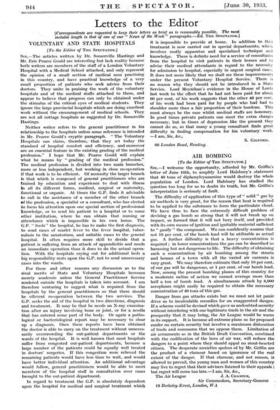AIR BOMBING
[To the Editor of THE SPECTATOR.]
Sm,—I welcome the opportunity, afforded by Mr. Griffin's letter of June 16th, to amplify Lord Halsbury's statement that 40 tons of diphenylcyanarsine would destroy the whole population of London. Lord Halsbury has studied the question too long for us to doubt its truth, but Mr. Griffin's interpretation is seriously at fault.
The difficulty of application of this type of" solid" gas by air methods is very great, for the reason that heat is required to be applied to the substance to form the particulate cloud. We have thus to face the extremely difficult problem of devising a gas bomb so strong that it will not break up on impact, so formed that it will not bury itself, and provided with its own means of ignition and ignitable material sufficient to " gasify " the compound. We can confidently assume that not 10 per cent. of the bomb load will be utilizable as actual gas. A further difficulty is that a heavy concentration is required ; in lower concentrations the gas can be described as harassing but not dangerous to life. The difficulty of obtaining such a concentration by air bombing among the streets and houses of a town with all the varied air currents is very great. We may therefore estimate that only 10 per cent. of our gas will be dangerous, or 1 per cent. of our bomb load. Now, among the present bombing planes of this country for a moderate radius of action we cannot average more than half a ton of bomb load. A simultaneous attack by 8,000 aeroplanes might easily be required to obtain the necessary concentration of 40 tons of this gas.
Danger from gas attacks exists but we must not let panic drive us to incalculable remedies for an exaggerated danger. If a scheme could be devised which gave us undoubted security without interfering with our legitimate trade in the air and the- prosperity that it may bring, the Air League would be warm in its support. It is because all extreme plans so far proposed, confer no certain security but involve a maximum dislocation- of trade and commerce that we oppose them. Limitation of air armaments as in the British Draft Convention, combined with the codification of the laws of air war, will reduce the dangers to a point where they should appal no stout-hearted citizen. The desperate anxieties spoken of by Mr. Griffin are the product of a clamour .based on ignorance of the real extent of the danger. If that clamour, and not reason, is allowed to prevail, the young men and women of this country. may live to regret that their advisers listened to their appeals ; but regret will come too late.—I am, Sir, &c.,
The Air League J. A. CHAMIER,










































 Previous page
Previous page